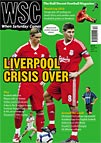 Natalia Sollohub examines whether a proposed semi-professional women's super league will actually happen
Natalia Sollohub examines whether a proposed semi-professional women's super league will actually happen
Anyone with even a passing interest in the women’s game in England will get a sense of déjà vu on hearing that a new summer league is due to kick off in 2011. The same announcement was greeted with much rejoicing just over a year ago with more than the required eight teams preparing applications to join the semi-professional Super League.